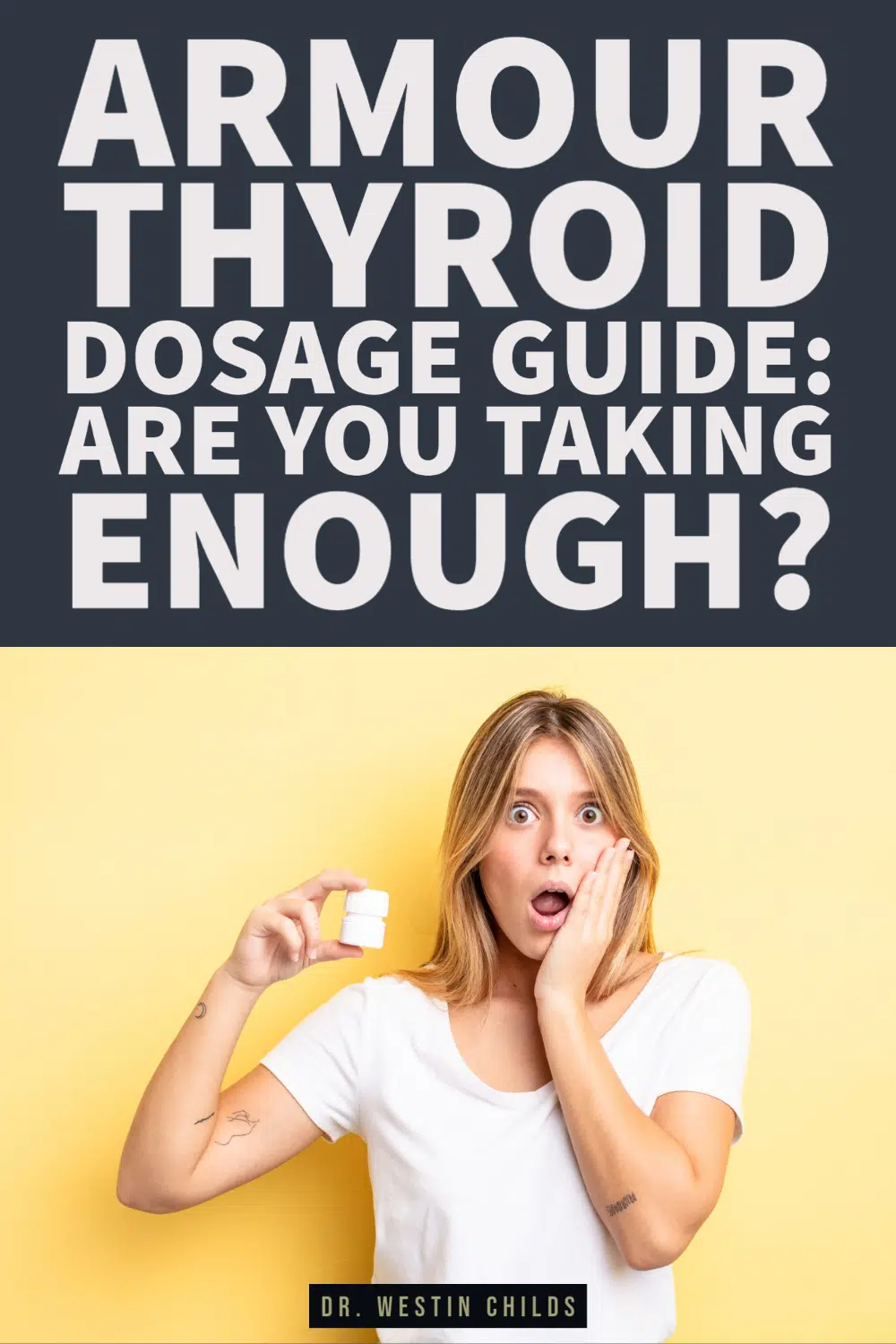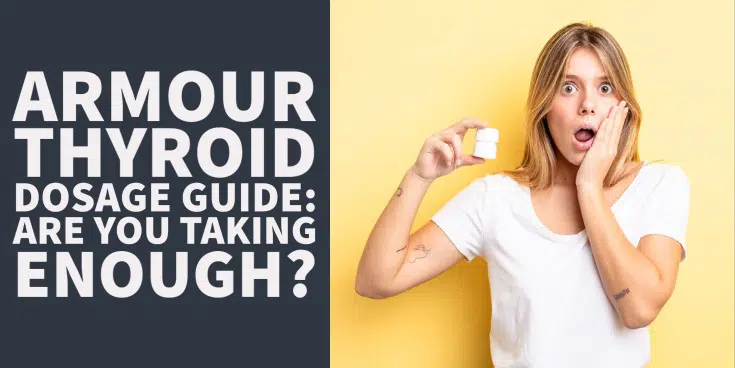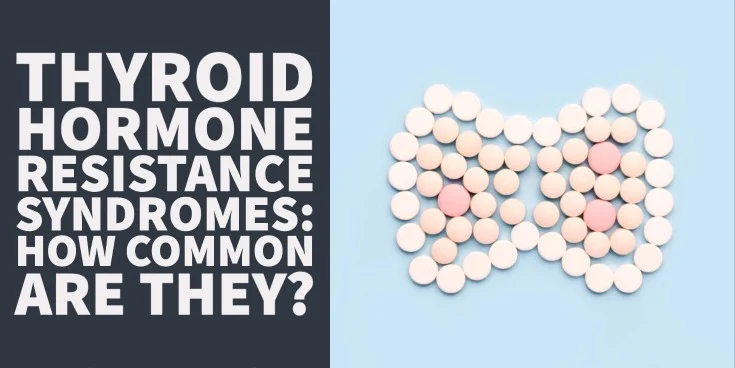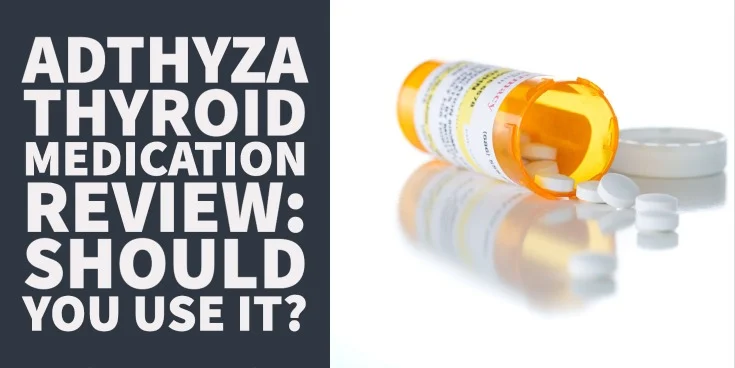Are you currently taking Armour Thyroid but not sure that your dose is where it should be?
Are you still struggling with fatigue, weight gain, or hair loss even after transitioning from levothyroxine to Armour?
Are you thinking about switching medications but not sure if Armour is right for you?
If so, this article is for you.
Article highlights:
- Armour thyroid dosing is highly individualized and each person will need a different dose.
- Several factors influence the dose that you will need.
- The average dose is somewhere between 60 mg (1 grain) and 120mg (2 grains) per day.
- Sensitive individuals will need doses smaller than 60mg while resistant individuals may need a dose higher than 120mg.
- The best way to find your optimal dose is through lab testing and closely following your symptoms.
- Many patients are underdosed when converting to Armour thyroid from other thyroid medications.
Armour Thyroid Dosing – How to Find Your Dose (The Good, the Bad, and the Ugly)
This article is going to be all about Armour thyroid and finding the right dose for your body.
This is probably the most important aspect to consider when taking thyroid medication and it’s not given enough attention by both patients and doctors.
And, believe it or not, it’s not always as straightforward as you think.
There are many factors that can alter how much Armour thyroid your body needs and other factors that can influence how effective the medication is once you take it.
If you are already familiar with Armour thyroid then you can skip to the sections below, but if you are new to it then you’ll want to read this section as well.
First off, what is Armour Thyroid?
Armour thyroid is a thyroid medication that is used to treat conditions that result in LOW thyroid hormone production (known as hypothyroidism).
Armour thyroid is one of many thyroid medications available but it is special because it contains a combination of both biologically active thyroid hormones.
Most doctors prescribe thyroid medications such as Synthroid or levothyroxine which contain only 1 form of thyroid hormone.
Armour thyroid is often considered superior and more powerful than those medications because it contains both T4 and T3 (it also contains other ingredients such as calcitonin, T2, and iodine but we won’t focus on those for today).
But, because it has T3, it’s often inaccurately dosed by doctors who aren’t used to prescribing these types of medications (1).
This can lead to persistent symptoms of hypothyroidism and other issues such as the inability to lose weight, hair loss, and persistent fatigue.
Most of these issues can be improved (or completely resolved in some cases) with accurate dosing.
DOWNLOAD FREE RESOURCES
Foods to Avoid if you Have Thyroid Problems:
I’ve found that these 10 foods cause the most problems for thyroid patients. Learn which foods you should avoid if you have thyroid disease of any type.
The Complete List of Thyroid Lab tests:
The list includes optimal ranges, normal ranges, and the complete list of tests you need to diagnose and manage thyroid disease correctly!
Each Person is Different (So is your dose!)
Before we jump into the specifics, it’s important to realize that the dosing of thyroid medication is highly unique and individualized.
Each person will require a slightly different dose compared to the next person, even individuals who have the same body weight/metabolism/etc.
Having said that, I want to give you some idea as to what dose range you should be expecting when taking Armour thyroid. This way you know if you are likely being underdosed or overdosed.
The average dose that most people need is somewhere between 1 grain (60mg) and 2 grains (120mg) per day.
About 60-70% of individuals will fall into this range.
About 5-10% of people will need a dose of less than 60mg per day (anywhere between 15mg and 60mg).
About 10-20% of people will need a dose higher than 120mg per day (anywhere between 120mg and 240mg).
These percentages are not perfect, but they are based on my own personal history of treating patients and discussing various doses with other doctors and practitioners.
Finding out where you fit into this spectrum can be difficult, but you can use the resources found here to help you find your optimal dose.
Dealing with Sensitivities
Even though Armour thyroid may be the right medication for you, you may not tolerate traditional doses.
What do I mean?
Armour thyroid is unique among thyroid medications in that it contains the active thyroid hormone T3.
And T3 is the most potent thyroid hormone available.
While it’s incredibly powerful and useful, there’s also a small chance that you might be someone who is sensitive to this particular ingredient.
You’ll know if you are sensitive because you may experience side effects such as heart palpitations, a jittery or anxious feeling, or a headache after taking your dose.
This doesn’t automatically mean that you shouldn’t take Armour thyroid (though it could), but instead may be a reflection of your sensitivity to the T3 found within the medication.
The good news is that most of the time these side effects can be mitigated by simply altering how much medication you take (and also how frequently you take it which is discussed below).
Those people who find that they are sensitive to Armour thyroid may also need a reduced dose compared to the average (2).
Most people need somewhere between 1 to 2 grains (or 60 to 120mg) per day, and those who are sensitive may only need 1/4 to 1/2 of a grain per day.
If you find that you are sensitive to the medication (3) then you’ll want to start out on a low dose and slowly increase your dose over a prolonged period of time.
Starting out with a dose of around 1/4 of a grain may be ideal.
From there you can increase your dose every 1-2 weeks as needed.
While some individuals may react to the T3 in Armour Thyroid there are others who may react to the inactive ingredients inside the medication as well.
Each medication contains fillers/binders which can potentially cause issues for certain people.
If you are reacting to the binders/fillers then you may need to switch medications entirely.
Do you need to Dose Multiple Times per Day?
Another strategy to mitigate the potential side effects of Armour thyroid is to split your dose and take it multiple times throughout the day.
This is a strategy employed successfully by many people taking all types of thyroid medications (including pure T3 medications and even T4 medications).
The logic for using this strategy is simple:
A normal thyroid gland, when functioning correctly, secretes a small amount of thyroid hormone constantly throughout the day.
When you take thyroid medication by mouth you are taking one massive dose which is supposed to last all day.
This means that you are temporarily taking more than you need first thing in the morning and this large dose of thyroid hormone can cause problems for certain sensitive individuals.
You can combat this by splitting your dose in half (or even thirds) and taking your dose in regular intervals throughout the day.
This reduces the massive flush that occurs from once-a-day dosing and may be ideal for some people, especially those who are sensitive to the T3 found within Armour.
Splitting your dose is actually very easy and shouldn’t cause any issues (as long as you follow all regular precautions when taking your medicine).
Let’s use an example:
Suppose that you are taking 2 grains of Armour thyroid per day.
Let’s also suppose that you are someone who is experiencing palpitations and flushing about 30-60 minutes after you take your medication.
You decide to alter how you take your medicine and split your dose into 2 divided doses.
You would proceed by taking 1 grain (60mg) first thing in the morning around 7:00 am (on an empty stomach).
Following that dose, you would take another 1 grain (60mg) around noon (on an empty stomach).
Following this regimen, you would still take your total dose of 2 grains each day but they would be split by at least 5 hours.
This may allow you to stay on your same dose while mitigating completely the side effects of heart palpitations and flushing.
You can also split this further and take your dose in 3 divided doses if necessary.
That would look something like this:
- Take 1 grain (60 mg) at 7 a.m. in the morning.
- Take 1/2 grain (30 mg) at noon.
- Take another 1/2 grain at 4:00 p.m.
With this regimen, you are still taking a total of 2 grains per day (60 mg + 30mg + 30mg) but it’s split between 3 doses.
If you elect to follow any of these schedules just make sure you take your medication on an empty stomach and away from other supplements (especially calcium or iron!).
Lab Testing on Armour Thyroid
Like other thyroid medications, it’s important that you check your lab tests regularly when you take Armour thyroid.
In the beginning, this may mean getting your labs tested every 6-8 weeks.
Once you find a stable and steady dose you may only need to check your dose every 3-4 months (or less frequently).
But because Armour thyroid is different from other thyroid medications such as levothyroxine and Synthroid, you need to be ordering more than just the standard TSH and free T4.
Remember:
Armour thyroid contains both T4 and T3 thyroid hormones.
When you are taking Armour thyroid you should, therefore, make sure to test BOTH your free T3 and Free T4 in addition to your TSH at a minimum.

I also recommend that you look at other thyroid lab tests, but these should be what you get at a minimum.
You should also be aware of how Armour thyroid changes your thyroid lab tests.
When you take T4-only medications (such as levothyroxine or Synthroid), your TSH should drop and your free T4 should increase (free T3 doesn’t always increase when taking T4-only medications).
When you take Armour thyroid (or other brands of NDT), you should see your TSH drop, your free T4 increase, and your Free T3 increase as well.
This pattern doesn’t always hold true, however.
Some individuals will find that their TSH will drop, their T4 will drop and their free T3 will increase.
This pattern is not always bad, but it does typically indicate that you are someone who is sensitive to the T3 found within the medication.
But, unless you check all these lab tests you won’t have any idea how you are reacting to the medication.
When taking Armour thyroid you should try to find a dose (typically between 1 and 2 grains per day) that keeps your TSH in the low/healthy range, your free T4 in the middle range, and your free T3 in the higher end of the reference range.
You can find more information about these ranges in this post.
If you are taking Armour thyroid and you find that your TSH is NOT decreasing then that is an indication that your dose is insufficient.
This typically occurs when your doctor attempts to transition you from a thyroid medication such as levothyroxine to Armour.
Remember:
The average dose of 1-2 grains per day is simply an average.
You could easily be on the high side or the low side of that average.
Some people may need doses as high as 4 grains per day while some people may need doses as low as 1/4 grain per day.
You can use your lab tests to help you figure out where you fit on this spectrum.
How to Tell if Your Dose is Too High
Another issue to watch out for is accidental overdosing on your medication.
Believe it or not, this can happen either accidentally or intentionally and is probably more common than people realize.
But it is something that you want to avoid because overdosing on your thyroid medication can lead to long-term consequences if you aren’t careful.
Some patients have been chronically underdosed with standard T4 medications for many years and, when they finally feel better on Armour thyroid, may think that they need more medication than they really do.
Persistent hypothyroidism can cause a range of issues including hormone imbalances that may not be corrected even when taking the appropriate dose of medication.
This can lead patients to take ever-increasing amounts of Armour thyroid in hopes of fixing these problems.
But the reality is that taking these high doses is not helpful and may be harmful.
You can read more about the dangers of taking too much medication in this post here.
So, how do you tell if your dose is too high?
You can use a combination of your lab tests and your symptoms.
If your dose is too high you will experience symptoms which include heart palpitations that do not decrease over time, flushing, headaches, sweating, weight loss, fatigue, and hair loss.
In addition, you will most likely find that your TSH is suppressed (or very low) and your free T3 is high (flagged as elevated and outside of the reference range).
The combination of these two things is an indication that you are taking too much thyroid medication and that you should reduce your dose.
Experiencing a high dose for a few days to weeks is probably not a huge deal to your body, but you should not continue to take medication causing these symptoms for longer than necessary.
Typically, reducing your dose will be enough to reduce these symptoms and bring your thyroid back to an acceptable level.
When & How to Take Your Medicine
For best results, you will want to make sure that you are taking your medication correctly.
Failing to take your medication correctly can cause all sorts of issues and may reduce the total effectiveness of your dose of medication and, in some cases, can render it completely ineffective.
When you go pick up your medication you are usually given instructions by the pharmacist to ‘take your medication on an empty stomach first thing in the morning’.
This holds true for ALL thyroid medications including Armour thyroid.
And the reason is simple:
Taking your thyroid medication with food has been shown in studies to reduce its absorption (4).
This means that instead of entering into your blood it is exiting your body in your stool!
In addition, you also want to avoid taking your medication with coffee which can also reduce its absorption.
Other items that interfere with thyroid medication include all supplements but especially supplements that contain calcium and/or iron (5).
These two are notorious for binding to and inactivating thyroid hormone before it enters your body.
I typically recommend that you wait for at least 30 to 60 minutes after taking your thyroid medication before you use thyroid supplements, but you’ll want to extend that out to 3-4 hours if you are taking iron or calcium.
You don’t always have to take your medication first thing in the morning as studies have shown that even taking your medication at night is effective (6).
That advice is typically given because it’s easiest to take your medication on an empty stomach first thing in the morning, but you can take it at any point in the day so long as you don’t take it with food/coffee/supplements (7).
Converting from T4 Medications to Armour Thyroid
Another important topic to cover as it relates to your dose is converting from other forms of thyroid medications to Armour thyroid.
This is an important point because typically this is done incorrectly.
The standard advice when transitioning from levothyroxine/Synthroid to Armour thyroid is to replace every 100mcg of Synthroid with 60mg of Armour thyroid.
The problem with this advice is that it typically results in underdosing of Armour thyroid.
Why?
Because each grain of Armour (which is 60mg) contains only 38 mcg of T4 and 9 mcg of T3.
When you transition from 100 mcg of T4 down to 38 mcg of T4 + 9 mcg of T3, the patient typically feels worse because they are taking a smaller dose of thyroid hormone than they were previously.
So, instead of following this standard advice, just be sure that you are aware that the conversion isn’t perfect and that it may require a higher dose than you or your doctor anticipate.
As long as you are aware of this, you shouldn’t be surprised if your labs look ‘worse’ upon your transition.
They will improve with time and as you adjust your dose appropriately.
In my experience, 100mcg of T4 is probably closer to 1.5 grains (or 90mg) or Armour thyroid than the 60mg that most places recommend.
Armour Thyroid vs. Other Brands of NDT
Armour thyroid falls into a class of drugs known as NDT.
NDT stands for natural desiccated thyroid and drugs in this class are all similar but differ in their inactive ingredients.
Armour thyroid is the original formulation of NDT but there are many other medications including NP thyroid and Adthyza (as of this writing, Nature-throid and WP Thyroid are not available).
Each comes with its own advantages and disadvantages.
Because of this, it’s important that you are at least aware of these other brands of medications.
Why?
Because it’s possible that while you may not necessarily tolerate one formulation of NDT it doesn’t mean you won’t tolerate them all.
I’ve seen many patients who don’t tolerate Armour thyroid but do tolerate NP Thyroid and vice versa.
Don’t give up on NDT medications if you experience a small reaction during your transition to Armour or when you first start it.
Instead, take note of your symptoms, try to determine what is causing them, and make changes as appropriate.
You may find that your problems are dose-related, medication-specific, or related to your sensitivities.
All of these issues can be overcome with careful consideration.
Conclusion
Armour thyroid is a great medication and one that can potentially help a great many people.
The key to using it correctly is to get your dose right!
This includes adjusting your dose based on your laboratory tests and based on your clinical symptoms.
Don’t be afraid to adjust your dose, take your dose multiple times during the day, or potentially switch to another brand of NDT if you are having trouble.
As you make these changes you will find that your symptoms improve and you should finally start to feel better.
Now I want to hear from you:
Are you currently taking Armour Thyroid?
Do you feel that your dose is optimal?
Are you experiencing any side effects?
Are you sensitive to T3?
Leave your questions or comments below!
Scientific References
#1. https://www.ncbi.nlm.nih.gov/pmc/articles/PMC4267409/
#2. https://www.ncbi.nlm.nih.gov/pmc/articles/PMC5772692/
#3. https://www.ncbi.nlm.nih.gov/books/NBK279066/
#4. https://www.ncbi.nlm.nih.gov/pmc/articles/PMC4650787/
#5. https://www.ncbi.nlm.nih.gov/pmc/articles/PMC3092723/
#6. https://www.ncbi.nlm.nih.gov/pmc/articles/PMC3139142/
#7. https://www.ncbi.nlm.nih.gov/pubmed/18341376








